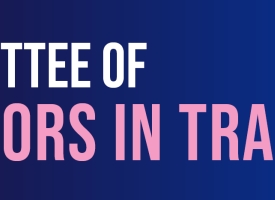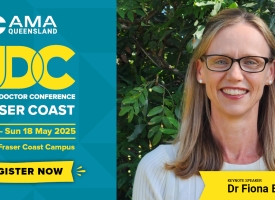PAs won't solve our workforce shortage
Queensland needs to ensure it is recruiting and training doctors, as physician's assistants are not the solution to our workforce shortage, AMA Queensland President Dr Nick Yim told ABC News Channel. "We have a workforce shortage in doctors, nurses, paramedics across the whole health service. We don't need band-aid fixes. We need a long-term solution to ensure that we continue caring for our patients across the state of Queensland."

Transcript: AMA Queensland President, Dr Nick Yim, ABC News Channel, News Day with Kathryn Robinson, Friday 2 August 2024
Subject: Physician’s assistants
KATHRYN ROBINSON: Queensland Health is working towards a plan to fill a medical staff shortage with a new category of health worker called the physician’s assistant. The Australian Medical Association is concerned the assistants won't be fully trained nor qualified. Dr Nick Yim is the Queensland President of the AMA and he joins me now from the Gold Coast. Nick, thanks for your time. Can you firstly start by telling us what exactly is a physician’s assistant? What's their role? What duties can they perform?
DR NICK YIM: This is one of the key aspects. There is a little bit of uncertainty of what is the role of the physician’s assistant currently in Queensland. There is no university that trains physician’s assistants. We have seen models of physician’s assistants working overseas, such as in the UK and America. So if we are going to import physician’s assistants into Australia, what is the regulation? Are they comparable to a UK-trained physician’s assistant as opposed to a US one?
KATHRYN ROBINSON: It's interesting isn't it, because when you read some of the information out there, I believe the University of Queensland used to run a master's level PA course, but that disappeared in 2011, and James Cook University in Townsville was the sole remaining provider until a couple of years ago. What is your understanding of what education facilities are out there running a course for PAs?
DR NICK YIM: There's a great deal of uncertainty. We're not aware of any university in Queensland running those education courses. I think the big issue here, it is a workforce issue in Queensland. We have a workforce shortage in doctors, nurses, paramedics across the whole health service. We don't need band-aid fixes. We need a long-term solution to ensure that we continue caring for our patients across the state of Queensland.
KATHRYN ROBINSON: Have physician's assistants been operating, though, in Queensland Health facilities for the last eight years? Is that right?
DR NICK YIM: There have been elements of physician's assistants in some jurisdictions, but they're quite minor in the roles. And the concern here is we just need to ensure that there's good governance practices, good safety protocols, and this is the reason why we need to ensure that we are consulting with Queensland Health to develop those strategies, but ultimately this is a workforce issue.
KATHRYN ROBINSON: We'll get on to the workforce issue in just a moment. What sort of roles have they currently been performing? I mean, are these people triaging? Are they prescribing medicines? Are they treating patients? What are they currently doing and what do you believe they should be doing?
DR NICK YIM: This is the great uncertainty. Some of the roles that they may be performing is assisting with the doctor right next to them. But the biggest concern with this expansion potentially is what is the supervision required? Some of the models that we have seen proposed is that there might be prescribing, they might be ordering investigations. This is the element - we don't know the competency. And what is the regulation of physician’s assistants?
KATHRYN ROBINSON: You mentioned the workforce shortages there in the medical sector, particularly in Queensland. If these people were trained effectively, would it not be a good idea?
DR NICK YIM: It might be a very short-term solution. However, what is the consequences in the long term? So many of the roles currently for a junior doctor, a doctor in training, they will be performing a lot of roles, such as taking a history, doing a full examination, ordering these investigations, prescribing. What is the consequence for our workforce, say five years, ten down the track if the junior doctor doesn't have those same experiences now?
KATHRYN ROBINSON: Would it be safe to have a physician's assistant who presumably wouldn't have a medical degree, wouldn't necessarily be registered with the Australian Health Practitioners’ Regulation Agency, Ahpra, if they are indeed prescribing medicines? I mean, is that a safe outcome in your opinion?
DR NICK YIM: This is one of the concerns. Doctors, nurses, pharmacists – we’re all registered under Ahpra. To my understanding and to our knowledge, physician’s assistants won't be regulated with Ahpra. The regulation is there for a reason. The regulation is there to ensure patient safety.
KATHRYN ROBINSON: Have you looked into physician’s assistants and how they work overseas in the US and the UK? I think there are models that they're using up to 3000 currently working in Britain?
DR NICK YIM: In the UK, there have been physician’s assistants and there's been significant concerns with regard to some patient outcomes. Some of the patient outcomes that we are hearing are obviously delayed diagnoses, misdiagnoses, and unfortunately there have been some deaths in the UK due to unfortunate circumstances of delayed diagnosis.
KATHRYN ROBINSON: Finally then, Nick, with respect to the workforce shortages that you're seeing in the Queensland healthcare system, if physician’s assistants are a short-term fix, what are some better long-term solutions that you'd like to see?
DR NICK YIM: The key element here is we need adequate funding investment into our healthcare sector. We need to ensure that we are recruiting doctors, we are training doctors. That could mean increasing numbers in medical schools. The key element is to increase the training moving forward.
KATHRYN ROBINSON: Dr Nick Yim, Queensland President of the AMA, thanks so much for joining us.



